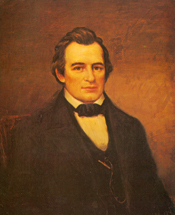John Winston Jones
This article needs additional citations for verification. (October 2020) |
John Winston Jones | |
|---|---|
 Portrait of Jones (c. 1835) | |
| 16th Speaker of the United States House of Representatives | |
| In office December 4, 1843 – March 4, 1845 | |
| Preceded by | John White |
| Succeeded by | John W. Davis |
| Leader of the House Democratic Caucus | |
| In office December 4, 1843 – March 4, 1845 | |
| Preceded by | James K. Polk |
| Succeeded by | Howell Cobb |
| Member of the U.S. House of Representatives from Virginia | |
| In office March 4, 1835 – March 3, 1845 | |
| Preceded by | William S. Archer (3rd) Walter Coles (6th) |
| Succeeded by | Walter Coles (3rd) James Seddon (6th) |
| Constituency | 3rd district (1835–43) 6th district (1843–45) |
| Chairman of the House Ways and Means Committee | |
| In office March 4, 1839 – March 3, 1841 | |
| Preceded by | Churchill C. Cambreleng |
| Succeeded by | Millard Fillmore |
| 22nd Speaker of the Virginia House of Delegates | |
| In office January 4, 1847 – December 6, 1847 | |
| Governor | William Smith |
| Preceded by | William Goode |
| Succeeded by | James F. Strother |
| Member of the Virginia House of Delegates from Chesterfield County | |
| In office December 7, 1846 – December 17, 1847 | |
| Preceded by | William Winfree |
| Succeeded by | Alexander Jones |
| Personal details | |
| Born | November 22, 1791 Amelia County, Virginia |
| Died | January 29, 1848 (aged 56) Petersburg, Virginia |
| Political party | Democratic |
| Other political affiliations | Democratic-Republican |
| Spouse | Harriet Boisseau |
| Children | Mary Winston Jones James Boisseau Jones Alexander Jones |
| Alma mater | The College of William & Mary |
| Profession | Lawyer |
John Winston Jones (November 22, 1791 – January 29, 1848) was an American politician and lawyer. He served five terms in the United States House of Representatives from 1835 to 1845. He served as Speaker of the House in both the U.S. House of Representatives (1843–1845) and the Virginia House of Delegates (1847).
Early life and career
[edit]Born November 22, 1791, in Amelia County, Virginia, he graduated from the College of William and Mary in 1813. He practiced law in Chesterfield County, Virginia before being appointed Prosecuting Attorney for Virginia's 5th Judicial Circuit in 1818. He was a delegate to the 1829–1830 state constitutional convention.
Tenure in Congress
[edit]Jones was elected as a Democrat to the United States House of Representatives in 1835 and served five terms. As he rose through the ranks of the House, he became chairman of the House Ways and Means Committee, replacing future president Millard Fillmore, and House Democratic Leader, succeeding future president James K. Polk.
He was elected to serve as Speaker of the House during the 28th Congress, which convened in 1843 and adjourned in 1845.
Jones declined nomination for a sixth term in Congress and returned to Virginia in 1845.
Career after Congress
[edit]Upon his retirement from Congress, he returned to the practice of law in Virginia. Among his more prominent cases, he served as lead counsel for Thomas Ritchie Jr., who in 1846 faced trial for his involvement in the infamous duel in which John Hampden Pleasants was fatally wounded. Ritchie won acquittal on the grounds of self-defense.[1]
That same year, Jones was elected to the Virginia House of Delegates and in 1847 was chosen as Speaker. He was elected to a second term in 1847, but did not attend the session due to illness. He resigned his seat on December 17. The vacant House seat was later filled by his son, Alexander.[2]
Private life
[edit]Jones married Harriet Boisseau in 1815 and together they had three children: Mary Winston, James Boisseau and Alexander. His son-in-law was George W.B. Towns, who was the 39th Governor of Georgia from 1847 to 1851.[3]
Jones died on January 29, 1848. He is buried in the family cemetery at his Dellwood Plantation northwest of Petersburg, Virginia.
Electoral history
[edit]- 1835; Jones was elected to the U.S. House of Representatives with 68.09% of the vote, defeating Whig William Segar Archer.
- 1837; Jones was re-elected unopposed.
- 1839; Jones was re-elected with 58.51% of the vote, defeating a Whig identified only as Taylor.
- 1841; Jones was re-elected with 69.47% of the vote, defeating Independents Junius E. Leigh and Thomas Miller.
- 1843; Jones was re-elected unopposed.
References
[edit]- Jamerson, Bruce F., Clerk of the House of Delegates, supervising (2007). Speakers and Clerks of the Virginia House of Delegates, 1776-2007. Richmond, Virginia: Virginia House of Delegates.
{{cite book}}: CS1 maint: multiple names: authors list (link)
External links
[edit]- 1791 births
- 1848 deaths
- College of William & Mary alumni
- Speakers of the United States House of Representatives
- Speakers of the Virginia House of Delegates
- Virginia lawyers
- Democratic Party members of the United States House of Representatives from Virginia
- Jacksonian members of the United States House of Representatives from Virginia
- 19th-century American legislators
- People from Amelia County, Virginia
- 19th-century Virginia politicians



